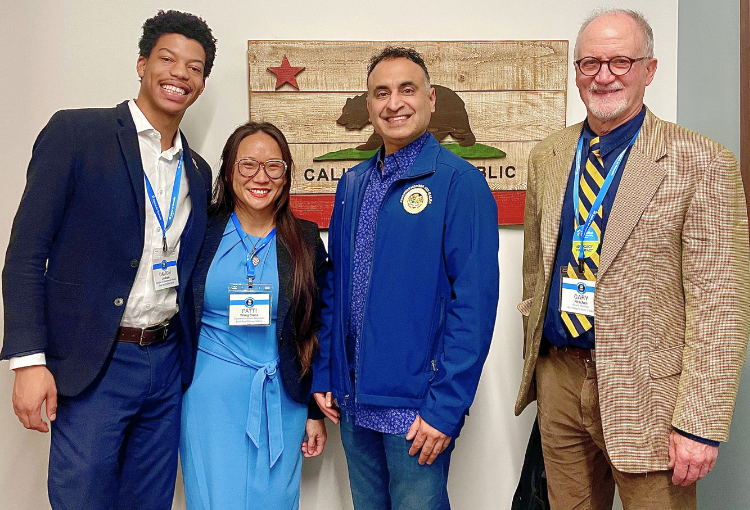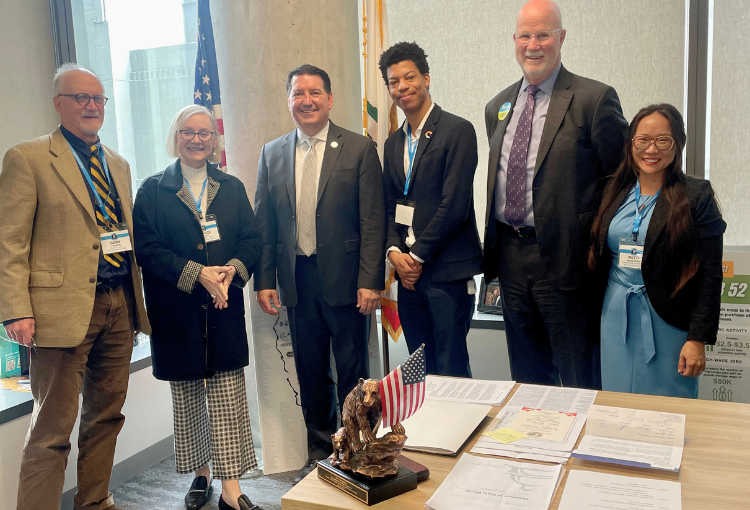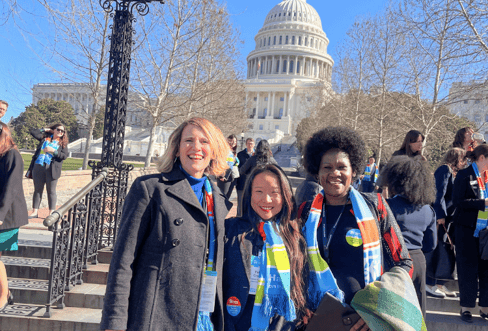
Turning Habitat’s Platform into Policy
It has been a whirlwind winter, as Habitat advocates pounded the pavement – or the marble floors – of leadership both in Sacramento and Washington, D.C. What does the state Capitol or the halls of Congress have to do with Habitat’s work in the East Bay and Silicon Valley? Plenty, as it turns out.
While Habitat depends on the generosity of our incredible community – donors, volunteers, sponsors, shoppers, and more – we also rely on our government partners and support. Did you know that close to 30% of the cost to build a typical Habitat home comes from government funding? Our government relationships and funding are also critical to our Home Preservation Program.
 It’s why when housing is being considered by our government, Habitat needs to have a seat at the table – to advocate for affordable homeownership as a crucial and powerfully transformative piece of solving our housing crisis and redressing fundamental inequities in our society.
It’s why when housing is being considered by our government, Habitat needs to have a seat at the table – to advocate for affordable homeownership as a crucial and powerfully transformative piece of solving our housing crisis and redressing fundamental inequities in our society.
How can our government help Habitat build more? Read on for a snapshot of what we’re asking for and learn how you can be a Habitat advocacy insider who raises your voice for change.

How Sacramento Can Build More
In January, Habitat East Bay/Silicon Valley joined up with advocates from most of California’s 33 Habitat affiliates in Sacramento for Advocacy Day. Our local team included staff and Board members, along with Daijon – advocating from both his Political Science and professional background, as well as his lived experience growing up in a Habitat home. Altogether our statewide advocates met with 110 legislators and staffers, securing commitments of support on both of our “asks”:
Restore $152.5M to CalHome: In his proposed budget, Governor Newsom not only completely zeroed out CalHome, but clawed back $152.5M that was already allocated for this fiscal year. Why does this matter? CalHome is the only state funding source for nonprofits like Habitat to build affordable homes for ownership.
Ensure fair tax assessment for low-income homeowners (AB 1868): Habitat California is sponsoring a bill – AB 1868 (Friedman) – to create consistency in property tax assessment for first-time, low-income homebuyers who, like Habitat homeowners, have deed restrictions that maintain their home’s affordability long-term. AB 1868 helps ensure these homes are not over-assessed – and that nonprofits like Habitat can use their resources to build more.
How Washington, D.C. Can Build More
In February, we sent Patti, our Communications Manager, to Capitol Hill to meet with the offices of our congressional representatives – as part of a nationwide Habitat day of advocacy known as Habitat on the Hill. In the company of 450 fellow Habitat advocates from across the country, Patti worked to build support for Habitat’s legislative priorities. We requested support for key funding programs like the Self-Help Homeownership Opportunity Program (SHOP) – which supports smaller Habitat affiliates in particular – and the USDA Section 502 Direct Loan Program – on which our rural affiliates rely heavily. For Habitat East Bay/Silicon Valley, we especially depend on:
HOME (The Home Investment Partnerships Program): We’re asking Congress to raise the investment in this critical funding source to $2.5B. Why? Because it supports Habitat’s work in myriad ways, from land acquisition to building to repair and beyond. Plus, it’s Habitat’s most-used federal funding source, and it has a strong track record of successfully building affordable housing.
CDBG (Community Development Block Grants): This flexible funding source can be used to address a range of community development needs, and Habitat uses it substantially here in the East Bay and Silicon Valley for both new construction developments and home repairs.
NHIA (The Neighborhood Homes Investment Act): If enacted, this new bipartisan legislation would support the construction and rehabilitation of 500,000 homes over the next 10 years. This act would spur building and preservation in disinvested neighborhoods through tax credits for investors that help builders like Habitat shoulder the cost of development and rehabilitation of affordable homes.
Make your voice heard!
If you’ve made it this far, you can see how much “building” Habitat does off the construction site – and how much partnership it takes to get the job done. Good, sound public policy is foundational to making (and keeping) affordable homeownership a reality for more of our neighbors.
Ultimately, the decisions made in the halls of leadership come down to the community to whom our leaders answer, and we have the power to make our values known. If you want to see Habitat build more – and you want our leaders to stand with you – sign up for our Advocacy Alerts for the latest on how to get involved.

Join the Conversation
Leave Us a Comment!
We love hearing from our community. Let us know what you think by leaving us a comment below.